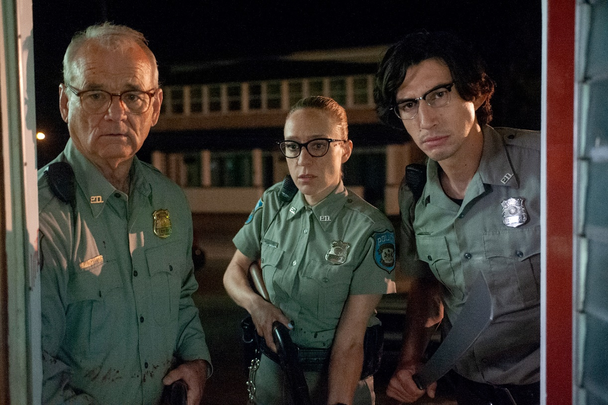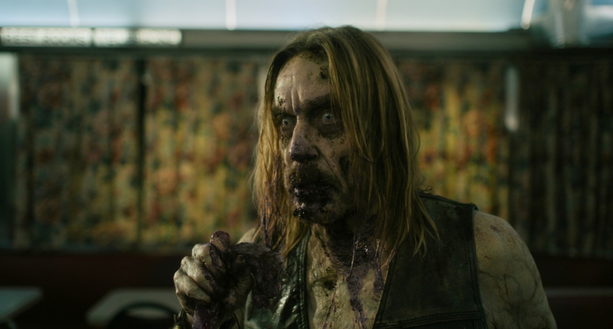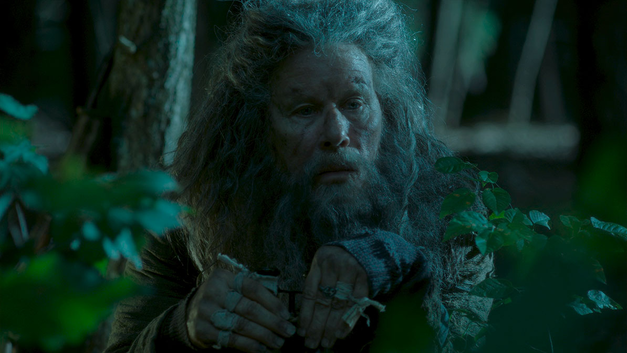Jim Jarmusch is no stranger to philosophical cinema; in fact he’s practically made it his brand. The Dead Don’t Die (2019) came as a departure from his previous film, Paterson (2016). That was a slow-burning poem in motion, this movie is a campy horror film that is at once a sendup of the Zombie Apocalypse genre, and a significant milestone in the Comedy-Horror canon. The story follows Robbie Paterson (Adam Driver) and Cliff Robertson (Bill Murray), police officers of Centerville, a (real) small town in Central Pennsylvania.
Bill Murray, Chloe Sevigny, and Adam Driver in The Dead Don’t Die (2019)
The opening moments of the film channel the looming dread of the current era of American Life. News broadcasts talk of “polar fracking” that has managed to move the earth off of its axis. Steve Buscemi's Maga Hat wearing Farmer Frank barks angrily at the diner television to drive the point home. Jarmusch’s parallel reality is one in which human greed, and political discord have wrought catastrophic effects on the world itself, with damning consequences. That night, as the moon rises, so do the dead. Two reanimated corpses climb out of their graves, head over to the diner, and literally eat the staff. This is only the beginning as more and more zombies begin to flock towards the town’s areas of life. As they stumble through the streets they croak the names of technologies, products, and drugs that they favored when they were alive. “Tooools”, “Xanaaax”, “Bluetooooth”. Through the Zombies’ fixations, and the cause of their undeath in the first place, this apocalypse can be seen as the “living” embodiment of humanity’s hubris.
Though possibly less deliberate than the references to Camus, Jarmusch’s end of the world also echoes the philosophy of Martin Heidegger. In his 1954 book The Question Concerning Technology he lays out the belief that technology shapes the way that we see and experience the world “Technology is a mode of revealing. Technology comes to presence in the realm where revealing and unconcealment take place, where aletheia, truth, happens.” (Heidegger).
His views on technology get darker though. Even though the inherent function that it fulfills is successful, the revelations that technology brings about are not by choice. Heidegger couldn’t have been talking about smart devices or any of the various things that seem to be vices to the zombies in the film, but his assessment still stands. Even though the machines allow us unprecedented connectedness to our world, and each-other, but this comes at the cost of our energy. Existence is the fuel by which the machine runs. Similarly, the film’s zombies seek out life to consume, motivated by their quest for modern conveniences.
In “The Myth of Sisyphus”, Camus asserts that the only true existential question to ask is whether or not life is worth living. He goes on to describe life in terms of absurdity. He claims that life is meaningless, and any meaning it seems to take on has merely been assigned for comfort’s sake. These constructions do not bear any real purpose but to placate us, and get us through to the next day. Camus wonders if given this information, we ought to just give in and give up on living. Well, we shouldn’t, he concludes at the piece’s end. Even though our goals are meaningless – as ineffectual as rolling a boulder up a hill in perpetuity – the meaning we will discover is in the work we do. “The struggle itself toward the heights, is enough to fill a man’s heart”.
It’s possible to look at The Dead Don’t Die as Jim Jarmusch’s response to the ideas Camus offered in 1942. He seems to acknowledge Camus’ answer to the suicide question but asks if the answer should be different in the modern era. Life is just as absurd, but in many ways it feels more hopeless. Camus’ assessment of society at that time couldn’t have accounted for a system of dependence on technology and the entities that create it for almost all of our information. We live in a constant state of being “plugged-in” that could be said to have robbed life of its meaning even further. Is survival in a time of heightened violence, and environmental degradation even worth the struggle?
The idea of a Zombie apocalypse is of course not a novel concept. Where Jarmusch’s end of the world stands out is in the way his characters act as the dead begin to rise. For one they all take on a deadpan inflection, failing to react as a normal person might to say, their undead ex-lover trying to eat them. The morning after the first gruesome zombie attack, the people of Centerville gather outside the diner to assess the situation. “What the hell was that? A wild animal? Several wild animals?” Hank Thompson (Danny Glover) asks Chief Robertson.
Later, when Ronnie arrives, he repeats the question, “Cliff, what the heck was it? A wild Animal? Several wild animals?”.
“That’s exactly what I said” Hank replies. The dry and often meta (the fourth wall is broken several times) dialogue is used for laughs, but also serves to disconnect the characters from reality. In this way, they and their ways of reacting to a zombie apocalypse can be seen as parallels to Camus different iterations of the “Absurd Man”. Someone who chooses to live in the face of the crushing weight of existence.
Zoe (Selena Gomez) and her crew of friends from the city enact Camus’ “Don Juanism”. Camus' vision of this philosophy is exemplified by the titular character, who flits from lover to lover engaging in romance in order to experience pleasure in an absurd world. Zoe and her friends are hipster roadtrippers, but in many ways they seem to still be living lives “that gratify [Their] every wish”. They come to centerville and remark on its quaint qualities, patronizing the local general store and reveling in its apparent ironic qualities. They are only interested in the experiences available to them, and once they have had them, they will move on.
Centerville is full of people that Camus called Conquerors, who wage war against their impending doom. A conqueror’s self-talk is something to the effect of: “Conscious that I cannot stand aloof from my time, I have decided to be an integral part of it”. Bobby Wiggins (Caleb Landry Jones) and Hank are Conquerors. As soon as they realize that a zombie apocalypse is happening, they act, barricading themselves in a hardware store, and stocking up on weapons and supplies. Once the zombies breach their wooden barricade, Bobby defiantly levels a shotgun at the head of the first zombie in line. “I got this one Hank” he says confidently and blows its head off.
The zombie falls to the ground, and the countless more behind it shuffle forward. Their ranks are endless. The camera cuts to the sober faces of Bobby and Hank, as they realize just how dire their situation is.
Though possibly less deliberate than the references to Camus, Jarmusch’s end of the world also echoes the philosophy of Martin Heidegger. In his 1954 book The Question Concerning Technology he lays out the belief that technology shapes the way that we see and experience the world “Technology is a mode of revealing. Technology comes to presence in the realm where revealing and unconcealment take place, where aletheia, truth, happens.” (Heidegger).
His views on technology get darker though. Even though the inherent function that it fulfills is successful, the revelations that technology brings about are not by choice. Heidegger couldn’t have been talking about smart devices or any of the various things that seem to be vices to the zombies in the film, but his assessment still stands. Even though the machines allow us unprecedented connectedness to our world, and each-other, but this comes at the cost of our energy. Existence is the fuel by which the machine runs. Similarly, the film’s zombies seek out life to consume, motivated by their quest for modern conveniences.
In “The Myth of Sisyphus”, Camus asserts that the only true existential question to ask is whether or not life is worth living. He goes on to describe life in terms of absurdity. He claims that life is meaningless, and any meaning it seems to take on has merely been assigned for comfort’s sake. These constructions do not bear any real purpose but to placate us, and get us through to the next day. Camus wonders if given this information, we ought to just give in and give up on living. Well, we shouldn’t, he concludes at the piece’s end. Even though our goals are meaningless – as ineffectual as rolling a boulder up a hill in perpetuity – the meaning we will discover is in the work we do. “The struggle itself toward the heights, is enough to fill a man’s heart”.
It’s possible to look at The Dead Don’t Die as Jim Jarmusch’s response to the ideas Camus offered in 1942. He seems to acknowledge Camus’ answer to the suicide question but asks if the answer should be different in the modern era. Life is just as absurd, but in many ways it feels more hopeless. Camus’ assessment of society at that time couldn’t have accounted for a system of dependence on technology and the entities that create it for almost all of our information. We live in a constant state of being “plugged-in” that could be said to have robbed life of its meaning even further. Is survival in a time of heightened violence, and environmental degradation even worth the struggle?
The idea of a Zombie apocalypse is of course not a novel concept. Where Jarmusch’s end of the world stands out is in the way his characters act as the dead begin to rise. For one they all take on a deadpan inflection, failing to react as a normal person might to say, their undead ex-lover trying to eat them. The morning after the first gruesome zombie attack, the people of Centerville gather outside the diner to assess the situation. “What the hell was that? A wild animal? Several wild animals?” Hank Thompson (Danny Glover) asks Chief Robertson.
Later, when Ronnie arrives, he repeats the question, “Cliff, what the heck was it? A wild Animal? Several wild animals?”.
“That’s exactly what I said” Hank replies. The dry and often meta (the fourth wall is broken several times) dialogue is used for laughs, but also serves to disconnect the characters from reality. In this way, they and their ways of reacting to a zombie apocalypse can be seen as parallels to Camus different iterations of the “Absurd Man”. Someone who chooses to live in the face of the crushing weight of existence.
Zoe (Selena Gomez) and her crew of friends from the city enact Camus’ “Don Juanism”. Camus' vision of this philosophy is exemplified by the titular character, who flits from lover to lover engaging in romance in order to experience pleasure in an absurd world. Zoe and her friends are hipster roadtrippers, but in many ways they seem to still be living lives “that gratify [Their] every wish”. They come to centerville and remark on its quaint qualities, patronizing the local general store and reveling in its apparent ironic qualities. They are only interested in the experiences available to them, and once they have had them, they will move on.
Centerville is full of people that Camus called Conquerors, who wage war against their impending doom. A conqueror’s self-talk is something to the effect of: “Conscious that I cannot stand aloof from my time, I have decided to be an integral part of it”. Bobby Wiggins (Caleb Landry Jones) and Hank are Conquerors. As soon as they realize that a zombie apocalypse is happening, they act, barricading themselves in a hardware store, and stocking up on weapons and supplies. Once the zombies breach their wooden barricade, Bobby defiantly levels a shotgun at the head of the first zombie in line. “I got this one Hank” he says confidently and blows its head off.
The zombie falls to the ground, and the countless more behind it shuffle forward. Their ranks are endless. The camera cuts to the sober faces of Bobby and Hank, as they realize just how dire their situation is.
A coffee craving zombie (Iggy Pop)
The film’s main characters are Camus’ Actor’s. In the section of Sisyphus called “Drama” Camus says “the actor has chosen multiple fame, the fame that is hallowed and tested. From the fact that everything is to die someday he draws the best conclusion”. In one of the movie’s final scenes Cliff and Ronnie sit in their squad car as zombies swarm it. “Can I ask you a question?” Ronnie asks, in an annoyed tone. “Sure, ask away”, Cliff replies.
“You’ve been saying this is all going to end badly, from the very beginning, over and over. What made you so sure of that? How did you know everything in advance?”
“Do you really want to know?”
“Yes I want to know! I really want to know!”
“Okay, I know because I read the script”.
At this moment we realize it's not just Cliff and Robbie sitting in the car. It’s actually Adam Driver and Bill Murray. The main characters are literally actors, creating characters for themselves and acting out parts to make some meaning out of the chaos around them. Like everyone else in the story, they die violent deaths. The pair makes a valiant last stand with machetes and shotguns but eventually the sheer enormity of the horde is too much for them, and they are consumed as well.
What Jarmusch is actually trying to say in this film is about as clear as the dust the movie’s undead evaporate into when they’re killed. Is he mocking Camus’ idea of the absurd man by showing its various iterations murdered in gruesome fashion? Hermit Bob’s (Tom Waits) closing lines to the movie suggest that Jarmusch sees consumerism as an extra wrench in the workings of the world. “[They’re] Just hungry for more stuff”.
“You’ve been saying this is all going to end badly, from the very beginning, over and over. What made you so sure of that? How did you know everything in advance?”
“Do you really want to know?”
“Yes I want to know! I really want to know!”
“Okay, I know because I read the script”.
At this moment we realize it's not just Cliff and Robbie sitting in the car. It’s actually Adam Driver and Bill Murray. The main characters are literally actors, creating characters for themselves and acting out parts to make some meaning out of the chaos around them. Like everyone else in the story, they die violent deaths. The pair makes a valiant last stand with machetes and shotguns but eventually the sheer enormity of the horde is too much for them, and they are consumed as well.
What Jarmusch is actually trying to say in this film is about as clear as the dust the movie’s undead evaporate into when they’re killed. Is he mocking Camus’ idea of the absurd man by showing its various iterations murdered in gruesome fashion? Hermit Bob’s (Tom Waits) closing lines to the movie suggest that Jarmusch sees consumerism as an extra wrench in the workings of the world. “[They’re] Just hungry for more stuff”.
Hermit Bob (Tom Waits)
Death comes for everyone, in the Absurd world, and in The Dead Don’t Die, whether it catches you unaware, you succumb to it, or even if you go down in a blaze of glory fighting for a purpose (however real). Hermit Bob sums it up perfectly with a statement that Camus would almost surely cosign “What a Fucked Up World."
Work Cited
Camus, Albert. “The Myth of Sisyphus”. 1942. http://www2.hawaii.edu/~freeman/courses/phil360/16.%20Myth%20of%20Sisyphus.pdf
Heidegger, Martin. The Question Concerning Technology. 1954.
Jarmusch, Jim. The Dead Don’t Die. Focus Features. 2019.
“The Technological View of the World of Martin Heidegger.” FutureLearn, https://www.futurelearn.com/info/courses/philosophy-of-technology/0/steps/26314.
Camus, Albert. “The Myth of Sisyphus”. 1942. http://www2.hawaii.edu/~freeman/courses/phil360/16.%20Myth%20of%20Sisyphus.pdf
Heidegger, Martin. The Question Concerning Technology. 1954.
Jarmusch, Jim. The Dead Don’t Die. Focus Features. 2019.
“The Technological View of the World of Martin Heidegger.” FutureLearn, https://www.futurelearn.com/info/courses/philosophy-of-technology/0/steps/26314.





